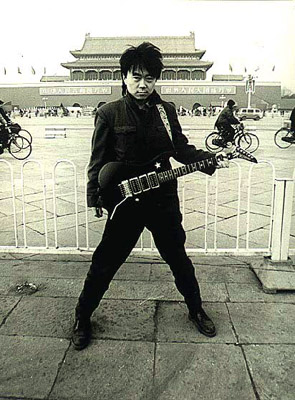The development of the "female rocker" in China was an extremely radical event in the 1980s and 90s. First off, China had recently emerged from a tightly controlled Communist government care of Mao Zedong. After Deng Xiaoping rose to power after Mao's death, the loosening of the restrictions on the Chinese people manifested itself in many different ways, one of which was the emergence of rock music.
Chinese musicians were influenced by Western rock and thus arose Chinese rock music. In a genre known for its rebelliousness and masculinity, the style came to naturally be dominated by men. Cui Jian, China's "grandfather of rock," was lauded and applauded for his musical talents and politically-charged lessons embedded in his lyrics. Many critics embraced his messages and in turn, the public listened. Women were slow to enter the rock genre, if they ever did. Traditionally, if women were singers, they were expected to belong in the pop music genre, singing sweet songs of love and happiness. Compared to rock music's characteristic angst-ridden, controversial lyrical content, pop music content seemed somewhat superficial and fluffy.

(Chinese rocker, Cui Jian)
When some female singers, such as Ai Jing, did enter the rock realm, though, this was their chance to voice their own opinions and, similar to Cui Jian, express their political views hidden within their song lyrics. This was also their opportunity to air their disagreement with the general gender inequality throughout China.How did the media respond to this? Well, if the media even acknowledged their music to begin with? Unfortunately, many news outlets either ignored the presence of female rock musicians or analyzed their music purely on an instrumental level. No notice was paid to these singers' lyrical content. Because the many controllers of the media refused to accept the fact that women were able to participate in rock music, these women, initially believing that this was their chance to have a say and voice in the political atmosphere at the time, were being silenced because of their gender.
It goes to show you how much power the media has over what information and knowledge the public has and can access. Do we notice something similar in American media? If we do, it's definitely to a lesser degree. Perhaps in the 80s and 90s, rock was considered a very masculine genre, but these days, I feel like women have gained somewhat stable footing in the rock realm.

No comments:
Post a Comment